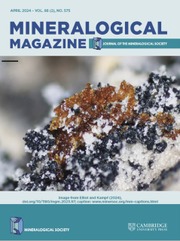Crossref Citations
This article has been cited by the following publications. This list is generated based on data provided by
Crossref.
Chakrabarty, A.
Mitchell, R. H.
Ren, M.
Sen, A. K.
and
Pruseth, K. L.
2013.
Rinkite, cerianite-(Ce), and hingganite-(Ce) in syenite gneisses from the Sushina Hill Complex, India: occurrence, compositional data and petrogenetic significance.
Mineralogical Magazine,
Vol. 77,
Issue. 8,
p.
3137.
Zaitsev, A. N.
Avdontseva, E. Yu.
Britvin, S. N.
Demény, A.
Homonnay, Z.
Jeffries, T. E.
Keller, J.
Krivovichev, V. G.
Markl, G.
Platonova, N. V.
Siidra, O. I.
Spratt, J.
and
Vennemann, T.
2013.
Oxo-magnesio-hastingsite, NaCa2(Mg2Fe3+3 )(Al2Si6)O22O2, a new anhydrous amphibole from the Deeti volcanic cone, Gregory rift, northern Tanzania.
Mineralogical Magazine,
Vol. 77,
Issue. 6,
p.
2773.
Chakhmouradian, A. R.
Cooper, M. A.
Medici, L.
Abdu, Y. A.
and
Shelukhina, Y. S.
2015.
Anzaite-(Ce), a new rare-earth mineral and structure type from the Afrikanda silicocarbonatite, Kola Peninsula, Russia.
Mineralogical Magazine,
Vol. 79,
Issue. 5,
p.
1231.
2015.
Geofluids.
p.
441.
2015.
Geofluids.
p.
419.
2015.
Geofluids.
p.
369.
Chakhmouradian, Anton R.
Reguir, Ekaterina P.
Couëslan, Christopher
and
Yang, Panseok
2016.
Calcite and dolomite in intrusive carbonatites. II. Trace-element variations.
Mineralogy and Petrology,
Vol. 110,
Issue. 2-3,
p.
361.
Hoshino, M.
Sanematsu, K.
and
Watanabe, Y.
2016.
Including Actinides.
Vol. 49,
Issue. ,
p.
129.
2016.
Forty-Second Rochester Mineralogical Symposium: Contributed Papers in Specimen Mineralogy—Part 1.
Rocks & Minerals,
Vol. 91,
Issue. 3,
p.
277.
A. Mahmoud, Soliman Abu Elatta
and
Williams-Jones, Anthony E.
2018.
Mineralogy and geochemistry studies on the Nusab El Balgum granitic batches, South Western Desert, Egypt.
Arabian Journal of Geosciences,
Vol. 11,
Issue. 18,
Vind, Johannes
Malfliet, Annelies
Blanpain, Bart
Tsakiridis, Petros
Tkaczyk, Alan
Vassiliadou, Vicky
and
Panias, Dimitrios
2018.
Rare Earth Element Phases in Bauxite Residue.
Minerals,
Vol. 8,
Issue. 2,
p.
77.
Amores-Casals, Sandra
Melgarejo, Joan-Carles
Bambi, Aurora
Gonçalves, Antonio Olimpio
Morais, Eduardo Alves
Manuel, Jose
Neto, Andre Buta
Costanzo, Alessandra
and
Martí Molist, Joan
2019.
Lamprophyre-Carbonatite Magma Mingling and Subsolidus Processes as Key Controls on Critical Element Concentration in Carbonatites—The Bonga Complex (Angola).
Minerals,
Vol. 9,
Issue. 10,
p.
601.
Li, Xiang
Liu, Yun-gui
Song, Hai-peng
Zhang, Qian
and
Wu, Xiang
2020.
Thermal stability and compressibility of bastnaesite.
Physics and Chemistry of Minerals,
Vol. 47,
Issue. 3,
Anenburg, Michael
Burnham, Antony D.
and
Hamilton, Jessica L.
2020.
Quadrivalent praseodymium in planetary materials.
American Mineralogist,
Vol. 105,
Issue. 12,
p.
1802.
Chukanov, Nikita V.
and
Vigasina, Marina F.
2020.
Vibrational (Infrared and Raman) Spectra of Minerals and Related Compounds.
p.
741.
Zaitsev, Anatoly N.
Spratt, John
Shtukenberg, Alexander G.
Zolotarev, Andrei A.
Britvin, Sergey N.
Petrov, Sergey V.
Kuptsova, Alina V.
and
Antonov, Anton V.
2021.
Oscillatory- and sector-zoned pyrochlore from carbonatites of the Kerimasi volcano, Gregory rift, Tanzania.
Mineralogical Magazine,
Vol. 85,
Issue. 4,
p.
532.
Giovannini, Arthur L.
Bastos Neto, Artur C.
Porto, Claudio G.
Takehara, Lucy
Pereira, Vitor P.
and
Bidone, Mauricio H.
2021.
REE mineralization (primary, supergene and sedimentary) associated to the Morro dos Seis Lagos Nb (REE, Ti) deposit (Amazonas, Brazil).
Ore Geology Reviews,
Vol. 137,
Issue. ,
p.
104308.
Horbe, Adriana Maria Coimbra
Albuquerque, Márcio Fernando Dos Santos
and
Dantas, Elton Luiz
2022.
Nd and Sr Isotopes and REE Investigation in Tropical Weathering Profiles of Amazon Region.
Frontiers in Earth Science,
Vol. 10,
Issue. ,
Navarro-Ciurana, Dídac
Corbella, Mercè
Farré-de-Pablo, Júlia
Corral, Isaac
Buixadera, Elisabeth
Morera-Valverde, Robert
and
Proenza, Joaquín A.
2023.
Rare Earth Elements’ particles in road dust: A mineralogical perspective for source identification.
Atmospheric Environment,
Vol. 309,
Issue. ,
p.
119927.
Zagyva, Tamás
Kaufmann, Felix E.D.
Shubeita, Samir de Moraes
Leay, Laura
Harrison, Mike
Taylor, Tracey
Harrison, Robert W.
and
O'Driscoll, Brian
2023.
Microstructure and radiation tolerance of molybdenum-rich glass composite nuclear waste forms.
Journal of Nuclear Materials,
Vol. 585,
Issue. ,
p.
154635.


